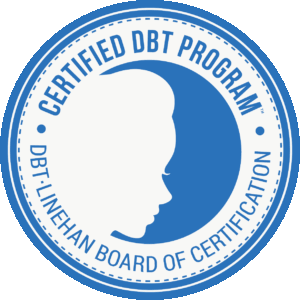Written By: Habeebah Abdus-Salaam, LSW, CSSW
Dialectical Behavior Therapy (DBT) has proven effective for children and teens struggling with emotional challenges like anxiety, depression, self-harm, and borderline personality disorder (BPD). Developed by Dr. Marsha Linehan, DBT blends cognitive-behavioral techniques with mindfulness strategies to help individuals regulate their emotions, improve relationships, and manage distress. While DBT is highly beneficial, parents play a key role in ensuring its success. Here’s how you can support your child or teen through DBT Therapy for Children and Teens.

How to Support Your Child or Teen Through DBT Therapy for Children and Teens
1. Learn the Core Principles of DBT
DBT is based on four primary principles. Mindfulness, distress tolerance, emotion regulation, and interpersonal effectiveness. Understanding these concepts can help you reinforce the skills your child is learning in therapy. Thus, creating a consistent environment at home. For example, mindfulness encourages being present and accepting emotions non-judgmentally, while distress tolerance focuses on coping with painful emotions without resorting to harmful behaviors.
2. Participate in Family Skills Training
Many DBT programs offer family skills training where parents can learn the same techniques their children are practicing. Attending these sessions shows your commitment to your child’s progress and gives you tools to model DBT skills in everyday interactions. Learning strategies like “DEAR MAN”, which helps communicate needs effectively while respecting others, can make practicing DBT feel less like an obligation and more like a shared effort.
3. Create a Nonjudgmental Home Environment
Validation is central to DBT and means acknowledging your child’s feelings without judgment. For example, if your teen says, “I feel like everything is falling apart,” respond with empathy, such as, “That sounds really overwhelming. I’m here to help.” Avoid dismissing their emotions or using phrases like, “You’re overreacting.” This helps maintain open communication and emotional safety.
4. Reinforce Skill Practice at Home
DBT involves learning and practicing a variety of skills, and success relies on applying them consistently outside of therapy. Encourage your child to use techniques like deep breathing for distress tolerance or mindfulness exercises during everyday stress. Celebrate small victories. Such as using a coping skill to manage a stressful situation, to keep them motivated.
5. Foster Open Communication
Create a space where your child feels safe to share their feelings. Active listening—giving your full attention without interrupting or judging—helps them feel understood. Instead of asking, “Did you have a good day?” try, “What was the best part of your day?” or “What challenged you today?” Also, normalizing discussions about mental health can help your child feel less alone and more comfortable opening up.

6. Model Healthy Emotional Regulation
Children learn by observing their parents. By modeling healthy emotional regulation, you provide a living example of how DBT skills can be applied in real life. For example, if you feel frustrated, use mindfulness techniques to pause and reflect before responding. Show your child how you practice radical acceptance in situations you cannot control, such as traffic. Sharing your process can help them see how DBT strategies work in everyday life.
7. Collaborate with Your Child’s Treatment Team
Stay in regular communication with your child’s DBT therapist. Share updates on your child’s progress and challenges to help the therapist tailor the treatment. Additionally, ask for specific guidance on how you can support therapy goals at home. This collaboration can ensure your child receives the most effective care.
8. Be Patient and Compassionate
DBT is a process that takes time, and it’s normal for children and teens to struggle while learning new skills. Setbacks are part of the journey, so it’s important to be patient and compassionate. Celebrate small steps forward, and remind yourself that progress isn’t always linear. Your support and encouragement can motivate your child to keep going, even during difficult moments.
9. Set Realistic Expectations
DBT helps your child improve emotional and interpersonal skills, but it’s important to set realistic expectations. Understand that DBT won’t eliminate all challenges. For example, if your child has struggled with self-harm, a reduction in frequency or intensity is a significant achievement, even if the behavior hasn’t completely stopped. Recognize these milestones and validate your child’s efforts.
10. Practice Self-Care as a Parent
Supporting a child through DBT can be emotionally demanding. To be effective, it’s essential to prioritize your own well-being. Consider joining a parent support group or connecting with others who understand the challenges. Make time for breaks to recharge, whether through exercise, hobbies, or quiet moments. You may also find therapy helpful in processing your own emotions and gaining strategies for managing the stress of supporting your child.
Final Thoughts
Supporting your child through DBT requires empathy, patience, and commitment. By learning about DBT with DBT of South Jersey, participating in family skills training, fostering open communication, and modeling healthy behaviors, you can create a nurturing environment that empowers your child to succeed. With your unwavering support, your child can build the skills they need to thrive in therapy and beyond, leading to improved emotional regulation, healthier relationships, and greater well-being. Remember, you don’t have to navigate this process alone. With the right resources, you and your child can successfully navigate the journey to healing.
https://mindbodyo.com/dialectical-behavior-therapy/
https://www.mentalhealth.com/library/dialectical-behavior-therapy
https://jamanetwork.com/journals/jamapsychiatry/fullarticle/2685324#google_vignette

Support Your Child With DBT Therapy for Children and Teens in South Jersey
At DBT of South Jersey, we specialize in helping children and teens build the skills they need to navigate life’s challenges with confidence and resilience. Our compassionate approach in Therapy for Children and Teens combines proven DBT techniques with personalized care to support emotional regulation and improve relationships. Empower your child to thrive with the guidance of experienced professionals dedicated to their growth and well-being. Follow these three simple steps to get started:




